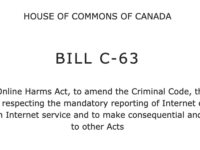Prime Minister Justin Trudeau recently claimed that “we’ve cut the cost of cell phone plans in half since 2019 – in part by increasing competition.” Is that true? What is the real state of Canadian wireless competition and how does pricing compare with other countries? To help answer those questions, this week David Soberman, a Professor of Marketing at the Rotman School of Management at the University of Toronto and the Canadian National Chair of Strategic Marketing joins the Law Bytes podcast. Professor Soberman’s research is focused on understanding how the operation of markets is affected by the exchange of information between organizations and customers, relationships within the distribution channel and the introduction of innovations to markets.
Latest Posts
The Law Bytes Podcast, Episode 200: Colin Bennett on the EU’s Surprising Adequacy Finding on Canadian Privacy Law
A little over five years ago, I launched the Law Bytes podcast with an episode featuring Elizabeth Denham, then the UK’s Information and Privacy Commissioner, who provided her perspective on Canadian privacy law. I must admit that I didn’t know what the future would hold for the podcast, but I certainly did not envision reaching 200 episodes. I think it’s been a fun, entertaining, and educational ride. I’m grateful to the incredible array of guests, to Gerardo Lebron Laboy, who has been there to help produce every episode, and to the listeners who regularly provide great feedback.
The podcast this week goes back to where it started with a look at Canadian privacy through the eyes of Europe. It flew under the radar screen for many, but earlier this year the EU concluded that Canada’s privacy law still provides an adequate level of protection for personal information. The decision comes as a bit of surprise to many given that Bill C-27 is currently at clause-by-clause review and there has been years of criticism that the law is outdated. To help understand the importance of the EU adequacy finding and its application to Canada, Colin Bennett, one of the world’s leading authorities on privacy and privacy governance, joins the podcast.
Debating the Online Harms Act: Insights from Two Recent Panels on Bill C-63
The Online Harms Act has sparked widespread debate over the past six weeks. I’ve covered the bill in a trio of Law Bytes podcast (Online Harms, Canada Human Rights Act, Criminal Code) and participated in several panels focused on the issue. Those panels are posted below. First, a panel titled the Online Harms Act: What’s Fact and What’s Fiction, sponsored by CIJA that included Emily Laidlaw, Richard Marceau and me. It paid particular attention to the intersection between the bill and online hate.
The Law Bytes Podcast, Episode 199: Boris Bytensky on the Criminal Code Reforms in the Online Harms Act
The Online Harms Act – otherwise known as Bill C-63 – is really at least three bills in one. The Law Bytes podcast tackled the Internet platform portion of the bill last month in an episode with Vivek Krishnamurthy and then last week Professor Richard Moon joined to talk about the return of Section 13 of the Canada Human Rights Act. Part three may the most controversial: the inclusion of Criminal Code changes that have left even supporters of the bill uncomfortable.
Boris Bytensky of the firm Bytensky Shikhman has been a leading Canadian criminal law lawyer for decades and currently serves as President of the Criminal Lawyers’ Association. He joins the podcast to discuss the bill’s Criminal Code reforms as he identifies some of the practical implications that have thus far been largely overlooked in the public debate.








![Red alert -[ HMM ]- by Carbon Arc CC BY-NC-SA 2.0 https://flic.kr/p/FgBkhR](https://www.michaelgeist.ca/wp-content/uploads/2024/10/25774555205_035a814280_k-100x75.jpg)


